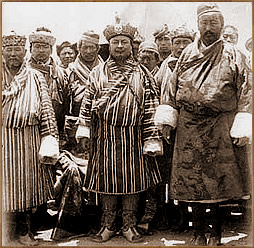| Ugyen
Wangchuck - The first hereditary Monarch of Bhutan |
 |
Bhutan Culture |
|
 |
Bhutan Information |
|
|
|
| Ugyen
WangchuckThe Younghusband Mission to Lhasa |
| A
new book by a Bhutanese researcher, Sonam Kinga |

|
 |
Ugyen
Wangchuck
at
the conclusion of Younghusband mission in Lhasa,
1904
To
his left: His cousin and father-in-law Kunzang Thinley.
(Photo:
Johnston and Hoffman, British Library ;
The
Raven Crown by Michael Aries) |
|
| What
today most Bhutanese know about Gongsar Ugyen Wangchuck are some obvious
facts: that he was elected as the first hereditary Monarch of Bhutan and
that he was knighted by the British empire in 1905. |
A
new book by a Bhutanese researcher, Sonam Kinga, Ugyen Wangchuck
The Younghusband Mission to Lhasa, throws considerable light on the personality
of the towering man and his scrupulous diplomacy in his dealings with the
British.
The
book is divided into two sections. The first outlines the story of Trongsa
Penlop Ugyen Wangchuck, who accompanied Younghusband in a mission to Lhasa
in 1904. The second is a Dzongkha and the English translations of the
lozey (which celebrates the jubilant success of Ugyen Wangchuck's role
in the mission) composed by the serf Jachi Tshewang Peldon, a poem by Zhabdrung
Jigme Chogyal (composed in Ugyen Wangchuck's honour when he left Bhutan
for Tibet to mediate in the mission), and a katsom denouncing the Anglo-Tibetan
conflict of 1898 written by the Nyenzer Trulku's Lhatsab (regent). |
|
The
book, published by Galing Printing and Publishing, begins by looking at
the historical events of the late 18th century which brought both Bhutan
and Tibet into contact with British India.
By
the beginning of the 20th century, according to Sonam Kinga, Bhutan
had established "firm relationship with British India governed by the 1865
Treaty of Sinchula". At that time Ugyen Wangchuck had risen as the unchallenged
and undisputed leader of the country. Thus the British chose to deal directly
with him for matters concerning Bhutan.
The
British, undeniably having gained his trust, also chose him to accompany
Younghusband in the mission. But what still remains vague is, what role
did Ugyen Wangchuck play in the mission? What were his contributions to
the success of the mission? The Younghusband mission to Lhasa, the author
says, was a part of the "Great Game", a clandestine struggle between Russia
and Britain for mastery of central Asia. The British feared the closing
frontiers of Russia drawing southward. Therefore, the sense of urgency
on the part of the British to accost the young Dalai Lama, win his political
trust and establish a formal Anglo-Tibetan diplomacy was great.
On January
8, 1903, the British sanctioned a mission to Lhasa to negotiate with
the Tibetans. But disagreement and distrust between them foiled the mission
which got stalled for almost a year. It was then that the British gradually
felt the need for Bhutan's support to "resolve their differences with the
Tibetans". And they counted on one man, Trongsa Penlop Ugyen Wangchuck.Although
initially the British sought Dzongpon Kunzang Thinley's help in their negotiations
with Tibet, the negotiations had failed. It was then that the master mediator
came into the scene.
The
author states that Ugyen Wangchuck's grasp of "both imperial realpolitik
and the Tibetan outlook made him an invaluable mediator". He was the only
player who enjoyed the trust of both Younghusband and the young Dalai Lama
and his desire was "to see that the British arrived at a peaceful settlement
with the Tibetans". This he did in Lhasa, convincing both parties in an
amicable solution. The mission was successful. The Anglo-Tibetan Convention
was signed in September, 1904, in the Potala Palace.
Ugyen
Wangchuck's successful mediation had evoked a national mood of jubilance.
This was a psychological defeat of other hopeful leaders of the country.
He was made the Knight Commander of Indian Empire in 1905. Ugyen
Wangchuck had become the unquestioned leader of Bhutan even before the
Monarchy was founded in 1907.
The Wood
Monkey Year, 2004, is the hundredth anniversary of Ugyen Wangchuck
and the Younghusband Mission. This book celebrates the significant event
which ultimately celebrates the great leader of Bhutan - Gongsar Ugyen
Wangchuck. Sonam Kinga's book bases itself on the best of the sources,
that is, on the account related by Younghusband himself in his book India
and Tibet. It also draws useful and insightful material from other Indian
and British sources.
 |
| Contributed
by
Gopilal Acharya, KUENSEL, Bhutan's National Newspaper |
|
About Bhutan
|

|
|


